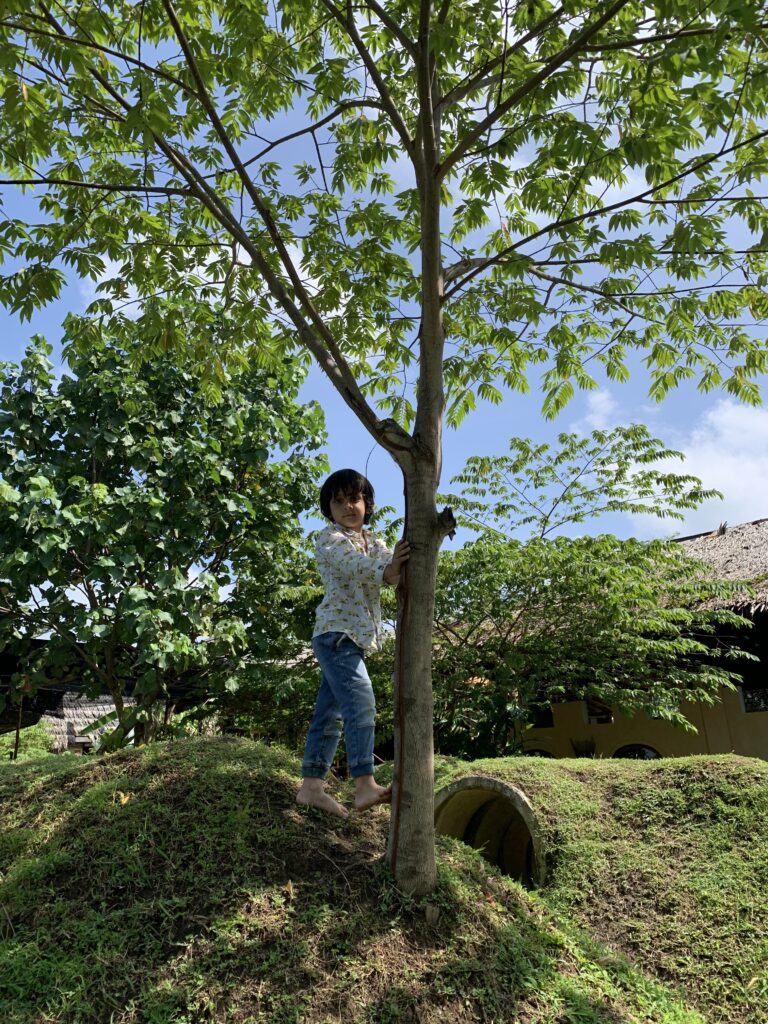Physical education, or PE as it is commonly known, is often associated with traditional sports like football or basketball. While these activities have their place, we believe that PE should encompass a broader range of experiences that connect students with their environment and community. This is why, alongside conventional sports, our curriculum includes activities that bring students closer to nature and the world around them.
Climbing trees, for instance, is not just an exhilarating physical challenge; it also fosters a sense of adventure and curiosity. Jungle and nature walks offer a unique opportunity for students to engage with the natural world, observing and learning about the flora and fauna that surround them. These experiences can spark a lifelong appreciation for the environment and a deeper understanding of our place within it.
Moreover, participating in communal activities like planting rice or harvesting coconuts is about more than just physical exertion. These tasks connect students to the cycles of agriculture and the rhythms of rural life, providing a tangible link to the food we eat and the labor that goes into producing it. It’s a lesson in humility, teamwork, and the interconnectedness of all things.
In this way, physical education at Empathy School transcends the boundaries of traditional sports. It becomes a conduit for experiential learning, where students not only develop their physical abilities but also cultivate a sense of empathy and connection with the world around them. This holistic approach to PE is a cornerstone of our educational philosophy, reflecting our belief that true learning encompasses mind, body, and spirit.
At Empathy School, we recognize the importance of introducing students to the natural environment and encouraging them to engage physically with the world around them. Our physical education curriculum is designed to be adaptable, ensuring that students of all ages can participate in activities that are appropriate for their developmental stage.
For our younger students in kindergarten, the focus is on fostering a sense of wonder and curiosity about nature. Simple activities like nature scavenger hunts or guided sensory walks allow them to explore their surroundings in a safe and structured way. These activities not only promote physical development but also help children develop observational skills and an appreciation for the natural world.
As students progress to middle school, the physical education program becomes more structured, with activities that challenge their growing bodies and minds. For example, team-building exercises such as constructing simple shelters or navigating obstacle courses in the forest can promote problem-solving skills and cooperation. These experiences are physically demanding and require students to think critically and work together, reinforcing the connection between physical and cognitive development.
Research supports the idea that engaging with nature and participating in physical activities can have a positive impact on children’s development. A study published in the International Journal of Environmental Research and Public Health found that outdoor physical activities can improve children’s motor skills, social interactions, and emotional well-being (Fjørtoft et al., 2017). Another study in the Journal of Environmental Psychology highlighted the cognitive benefits of nature exposure, showing that children who spend more time in natural settings have improved attention and memory (Wells, 2000).
By incorporating a variety of physical activities that connect students with the natural environment, Empathy School aims to provide a holistic education that nurtures the physical, cognitive, and emotional development of our students.


 Previous Post
Previous Post